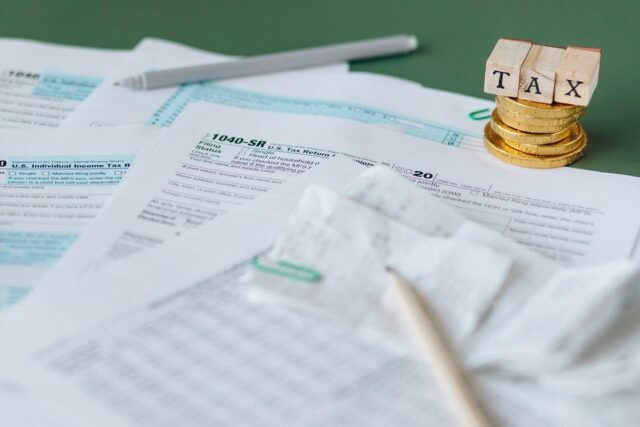
With separate taxes imposed by federal, state and local governments, the US tax system is notoriously complicated and confusing.
If you try to make your own business records, calculate your own expenses and then file your own taxes, it can be a long and complex process.
So don’t feel you’re economically deficient in some way if you struggle with all the details – it is a tricky area to navigate for everyone. Many business experts struggle with their tax payments too.
You’ll find that there are potential hazards throughout the taxation process – so it pays to consult expert help either in person or online whenever you feel uncertain.
But it doesn’t help that the internet is full of conflicting advice. For example, make sure that anything you look up online is (a) up-to-date and (b) relevant to the US.
It is usually very helpful to any business or liable individual to understand the principles of how and when they pay tax though. These economic facts from this site can help you make important business decisions in future.
Many liable people still make big mistakes along the way, however. Tax experts have produced this useful list of some of the common myths and mistakes made.
Are you guilty of any of these howlers?
1. Filing Your Taxes is Voluntary

Incredibly, some Americans still believe this odd myth about the US tax system. They believe you have no legal obligation to pay – it’s simply up to the individual.
Perhaps the belief stems from some official tax forms that actually do describe the whole system as ‘voluntary’ – but really mean that it’s up to you to sort it out yourself.
Trying to tell an IRS investigator you haven’t paid any taxes because you thought the system was voluntary is probably not a wise strategy.
2. Pets are Legitimate Dependents
You may love your animals – and they may be very expensive to keep. But you are completely unable to claim them as dependents on your tax forms.
Of course many still try to. Officials commonly spot ‘Rover’ or ‘Tiddles’ on the submitted lists of dependents. Beware that false claims of dependents isn’t as funny as it sometimes seems – and can be considered as tax fraud by officials.
3. The IRS Will File Your Return for You if You Don’t
This stems from the truth that if the tax office suspects fraud they can compile a legitimate and verified tax return on your behalf. But that’s part of their investigation process and not something you want to encourage.
Legally you have to file your own tax return. If you sit waiting for the IRS to do it for you, a ton of trouble could be about to land on your head…
4. My Income Was Illegal, so it’s Non-Taxable

Ask Al Capone how that excuse went down for him. The IRS only cares about income, not where it came from.
That means that even illegal earnings are taxable. How on earth did you end up with illegal income?
We won’t ask – but failure to pay taxes on it merely compounds the potential trouble you’re heading for.
5. Online Earnings Are Tax-Free
Do business online and you’ll skip filling out a W-9 form. That doesn’t mean that earnings won’t be liable to tax though.
The IRS treats online and off-line earnings exactly the same. So you have to declare it, wherever it came from.
6. My Accountant is Liable for Any Mistakes in my Return
Some do their own returns; others employ tax advisors and accountants. Whatever you do, however, the tax return is yours – and that means therefore that you are liable for its contents.
If there are mistakes, you are the one who will suffer. If your accountant compiled your return, you still are expected to double-check it.
7. There is no tax on students

This is not a completely baseless myth. So it is true to some extent that if you are a student, you do not need to pay taxes. But there is a condition, which is, that you have to be dependent upon someone. If you are earning less than $12,550 and you are dependent upon your guardian or parents, you are exempted. However, if you are working as a student and you are earning a hefty sum, which is more than 12,550 dollars for the tax year, you will need to pay your taxes.
Likewise, if you have got a good job and your earnings are good, you are liable to pay the tax. You might think that who would know if you are earning or not because you are still a student. Therefore, you might think that you can hide your money. However, this is just your wishful thinking. It is better that you go and register yourself as a taxpayer. Because if you do not do that, your employer will withhold some amount from your paycheck to pay the taxes.
8. Not earning enough money
Of course, if you are not earning enough money, you won’t need to pay any tax. However, it is still an important thing to register yourself as a taxpayer. If your earnings are less than the set amount, they won’t ask you to pay your tax. Furthermore, you will be able to enjoy the benefits of a taxpayer.
What if you do not register yourself?
The audit teams are always looking for such people. There is only a 1 percent chance to do an audit on people who are earning less than 100k dollars annually. Therefore, you might think that you are safe for a while but for how long?
Even with less income, there are certain things on which you are still liable to pay the tax amount. Therefore, when you are not paying the tax you should make a record of everything. Everything that can work as a factor to deduct your taxes. It will be better to save all your receipts because they will come in handy during an audit.
These are some of the myths that people believe in and you might also hear them. So if you are thinking about registering yourself as a taxpayer, you should learn about the eligibility criteria. It would be better to consult a lawyer.
Or if you believed any of these tax myths it might be a good idea to consult a tax advisor. No-one enjoys filing their taxes – but be warned that not filing them can be a whole lot worse.
To sum up
There are benefits to registering yourself as a taxpayer. You will be giving the tax to the government in any way. If you are a registered taxpayer, there won’t be any extra amount for you to pay. On the other hand, people who are not registered pay a relatively higher price.
For example, you go to a restaurant and pay the bill. There will be less GST for taxpayers. Contrary to that, non-taxpayers will pay a higher price. Sometimes, it is 16 percent of your total bill. So by paying one-time tax, you will be saving yourself from these multiple taxes.












